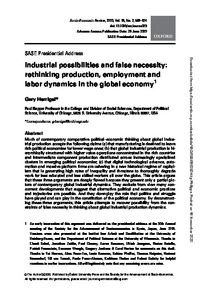Industrial possibilities and false necessity: rethinking production, employment and labor dynamics in the global economy

2020
18
2
April
599-624
industrial production ; industrial economics ; globalization
Industrial economics
https://doi.org/10.1093/ser/mwaa023
English
Bibliogr.
"Much of contemporary comparative political–economic thinking about global industrial production accepts the following claims (a) that manufacturing is destined to leave rich political economies for lower wage ones; (b) that global industrial production is hierarchically structured with higher value operations concentrated in the rich countries and intermediate component production distributed across increasingly specialized clusters in emerging political economies; (c) that digital technological advance, automation and massive platform firms are ushering in a new historical regime of capitalism that is generating high rates of inequality and threatens to thoroughly degrade work for less educated and less skilled workers all over the globe. This article argues that these three arguments are deeply flawed because they present only a partial picture of contemporary global industrial dynamics. They exclude from view many concurrent developments that suggest that alternative political and economic practices and trajectories are possible. And they downplay the role that politics and struggle have played and can play in the constitution of the political economy. By deconstructing these three arguments, this article attempts to recover possibility from the constraints of false necessity in thinking about global industrial production dynamics."
Digital
The ETUI is co-funded by the European Union. Views and opinions expressed are however those of the author(s) only and do not necessarily reflect those of the European Union or the ETUI.